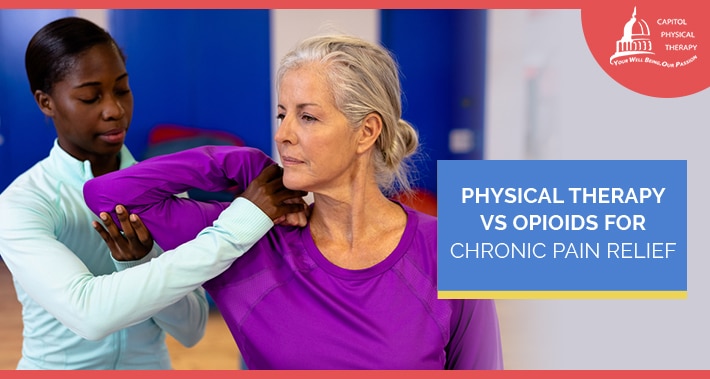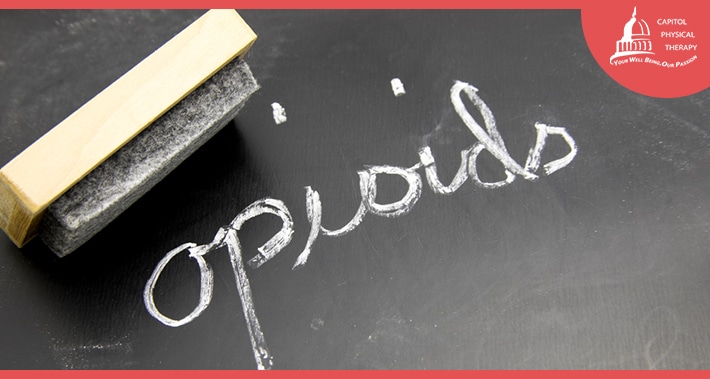
Are you dealing with chronic pain?
If so, you may have been prescribed opioids by your medical doctor as a way to manage the pain.
However, you may also have heard of the opioid epidemic that has been growing in recent years, and are hoping for a safer alternative to opioids for your pain management.
A chronic pain physical therapist can help.
According to the Centers for Disease Control and Prevention, drug overdose deaths have nearly quadrupled since 1999, to more than 70,000 in 2019 – 70% of which involved opioids.
Opioids have their uses, but the CDC has recommended, among other things, that physical therapy can help with certain types of chronic pain, both alongside opioids and as an alternative to them.
Choosing the best pain management option is different from person to person, which is why it’s always a good idea to speak to both your medical doctor and to book your appointment with Capitol Physical Therapy.
Together, we can advise you on the best course of action to meet your needs.
But for now, let’s take a closer look at opioids vs. physical therapy for pain management.
What Are Opioids?
Opioids, also known as opiates, are a class of drugs created from the opium poppy, such as morphine and codeine.
They also include certain manufactured substances, such as oxycodone and heroin.
Opioids work by interrupting the pain signals in your brain which subsequently reduces your perception of pain.
For this reason, they are commonly prescribed for pain management.
Some opioids, such as heroin, are controlled substances – that is, substances that are more closely regulated by the government, since there’s a higher risk of abuse.
In spite of this, though, some people end up using these substances without the guidance of a healthcare professional, which can be dangerous.
Long term use of opioids, both prescription and recreational, can impact your brain’s ability to produce natural painkillers and may lead to numerous serious health complications.
What Is Opioid Addiction?
In addition to their pain killing properties, opioids also cause intense feelings of pleasure.
This is what makes them so highly addictive.
Opioid abuse refers to any opioid use not prescribed by a physician.
For instance, using opioids recreationally, as well as taking more than prescribed may be considered abuse.
Opioid abuse can easily turn into opioid addiction, which is a neuropsychological disorder where you have an intense urge to continue using opioids despite the harm they may be causing.
Other potential complications resulting from opioid abuse and addiction include:
- Weakened immune system
- Slow breathing rate
- Coma
- Increased risk of HIV, hepatitis, and other infectious diseases spread through improper injection
- Hallucinations
- Collapsed veins or clogged blood vessels
- Risk of choking
How To Recognize An Opioid Overdose
If somebody you know is experiencing an opioid overdose, it’s important to get medical attention for them right away.
Symptoms of an opioid overdose may include:
- Loss of consciousness
- Inability to speak
- Slow, shallow breathing
- Erratic breathing
- Not breathing at all
- Bluish purple skin (if they’re naturally lighter skinned)
- Gray skin (if they’re naturally darker skinned)
- Pale, clammy skin, especially in their face
- Blue or purplish lips
- Slow, erratic, or absent pulse
- Choking, gurgling sounds similar to snoring
- Limp body
- Vomiting
- Being unresponsive
Pharmacies here in the DC area offer free naloxone kits, which is a drug that can rapidly reverse an opioid overdose.
It’s a good idea to have one on hand, since you may be in a situation where somebody nearby overdoses.
If you or somebody you know is dealing with substance abuse, SAMHSA offers a confidential substance abuse hotline – call 1-800-662-4357.
Opioid Addiction Symptoms
Now that you know more about opioid addiction, you might be wondering how to tell if you or a loved one is developing an addiction.
Symptoms of opioid addiction may include:
- An increased tolerance for the drug
- An inability to stop or reduce usage
- Experiencing withdrawal symptoms when you stop using
- Continuing use even when health complications occur
- Interfering with your mental health, relationships, or employment
- Spending excess time and money on drugs
- Excessive sleeping
- Sudden, extreme weight changes
- Turning to crime to pay for more drugs
Opioid Withdrawal Symptoms
People who are addicted to opioids experience intense withdrawal symptoms once they stop using the drugs.
Symptoms of opioid withdrawal may include:
- Anxiety
- Sweating
- Insomnia
- Excessive grumpiness
- Body tremors
- Muscle aches
- Nausea, vomiting, and diarrhea
- Extreme mental and physical discomfort
You can still experience withdrawal symptoms even if your opioid dependence is minor.
The length and intensity of withdrawal symptoms depends on a few factors, including:
- The type of opioid you’re addicted to
- The length of your addiction
- How much you’re taking
What Is Opioid Induced Hyperalgesia?
Opioid use can sometimes come with a condition called opioid induced hyperalgesia.
This is a condition where taking opioids can actually make you more susceptible to pain.
Hyperalgesia is a result of impaired pain receptors in your brain and subsequently causes your body to develop an enhanced pain response.
People with hyperalgesia perceive generally painless sensations, such as a light touch, as excruciating.
Opioid induced hyperalgesia can occur regardless of how much you take, but if you’re experiencing it, your doctor may increase your dosage in order to achieve the same pain relief effects.
This can increase your risk of abuse or addiction.
As well, your body starts to forget how to make its own painkillers, making you more reliant on the drug for relief.
When Are Opioids Best Used?
Despite their risks, opioids may still be beneficial for certain individuals.
People receiving cancer treatment, palliative care, and end of life care are often prescribed opioids to help with pain management.
Additionally, certain acute care patients, such as post operative patients, may benefit from prescription opioids for pain management.
RELATED: Surgery Recovery Physical Therapy Clinic
However, care must be made to reduce the risks of opioid addiction.
In all other cases of pain management, the CDC recommends non opioid alternatives, such as physical therapy.

Considering Physical Therapy Vs Opioids For Chronic Pain
If you’re dealing with chronic pain, you might feel like you’re unable to tolerate physical therapy.
This is common barrier to treatment.
Unfortunately, because physical therapy can often be more effective in the long term, this can also be a barrier to pain relief.
Your physical therapist can work with you to determine whether physical therapy is right for you.
Below are some general guidelines to consider when choosing between physical therapy and opioids for chronic pain relief.
1. Consider The Costs Vs Benefits Of Opioid Use
As discussed above, long term opioid use is linked with several serious side effects, such as depression, addiction, overdose, and opioid induced hyperalgesia.
Physical therapy, of course, doesn’t have this risk, but it may take longer to manage your chronic pain vs the quickness of a pill.
2. Consider That Opioid Addiction Risk Increases With Long Term Use
Opioid use for chronic pain may increase your risk of developing an addiction.
Any pain that lasts longer than 90 days is considered chronic.
Continued use of prescription opioid past 90 days increases your risk of developing a dependence, and ultimately an addiction, to opioids.
Consider physical therapy as an alternative to opioids for chronic pain to mitigate these risks.
3. Consider The Evidence Which Shows Certain Disorders Benefit From Physical Therapy
Physical therapists frequently work with clients experiencing pain due to a variety of disorders and conditions.
Certain conditions, such as lower back pain, osteoarthritis, and fibromyalgia have been shown to respond particularly well to physical therapy.
If your chronic pain is linked with one of these conditions, you may benefit from physical therapy treatments.
4. Consider That Physical Therapy Addresses The Actual Cause Of Your Pain
Prescription opioids will certainly mask your pain, but they won’t help deal with its underlying cause.
On the other hand, physical therapy is designed to target the root cause of your pain.
In some cases, such as with a broken bone, your body will heal itself and the pain should naturally subside in 6-8 weeks.
Physical therapy can help reduce stiffness and weakness in nearby regions and help you know when you can start to resume activity safely.
Physical therapy can also treat pain that lasts beyond typical tissue healing
But with many chronic conditions, physical therapy can make a significant difference in managing your pain.
Speak to a physical therapist to find out if physical therapy can help the specific cause of your pain.
Is Physical Therapy For Chronic Pain Right For You?
It’s important to note that physical therapists can’t prescribe medication or change dosages.
Such conversations ought to be had with your medical doctor.
However, physical therapy can provide an alternative to prescription opioids.
Physical therapists are qualified to work with individuals dealing with chronic pain due to a variety of conditions, such as:
- Trauma and injury
- Myofascial pain syndrome
- Chronic headaches
- Diabetes
- Neuropathic pain
- Rheumatoid arthritis
- Osteoarthritis
- Fibromyalgia
Your physical therapist will evaluate your strengths, limitations, and general health in order to construct a personalized treatment plan that is right for you.
Book Your Appointment With Capitol Physical Therapy Today
Are you interested in hearing more about physical therapy alternatives to opioid use for chronic pain?
At Capitol Physical Therapy, we can help.
Book your appointment with Capitol Physical Therapy today, and take your first step toward a pain free tomorrow.
1331 H St NW #200,
Washington, DC 20005
- https://g.page/capitolptdc
9560 Pennsylvania Ave. # 202,
Upper Marlboro, MD 20772
- https://goo.gl/maps/zjL4NnnuThRhrcS86
Capitol Physical Therapy offers orthopedic and other pain related solutions, with our versitile team of physical therapists in Washington, DC